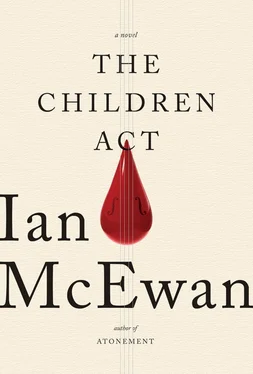She already knew from Ball that he was in Newcastle for the retrial of a murder case in which a man was alleged to have bludgeoned his mother to death at her home because of her ill-treatment of her youngest child, the half sister of the accused. No murder weapon was found and the DNA evidence was inconclusive. The defense’s case was that the woman had been killed by an intruder. The trial had collapsed when it was discovered that one juror had revealed to the others information he had got from the Internet through his phone. He had found a five-year-old tabloid story about the accused man’s previous conviction for violent assault. In the new age of digital access, something had to be done to “clarify” matters for juries. The professor of jurisprudence had lately been making a submission to the Law Commission, and this must have been the conversation that Fiona interrupted when she came into the room. Now it resumed. The fiber-optic man was asking how one could ever prevent juries from looking things up in the privacy of their homes, or from getting a family member to do it for them. Relatively simple, was the professor’s point. Juries would police themselves. They would be obliged, under threat of a custodial sentence, to report anyone discussing matters not presented in court. Two years maximum for doing so, six months maximum for failing to report a breach. The commission would deliver its conclusions next year.
Just then the butler came in to invite them to the dinner table. Though he could hardly have been out of his thirties, his face was deadly pale, as though dusted in powder. As white as an aspirin, she had once heard a rural French lady say. But he didn’t seem to be ill, for his presentation was impersonal and assured. While he stood to one side, attentively stooped, they finished their drinks and followed Fiona through a set of double doors to the dining room. The table, which could have seated thirty guests, was set for five at one lonely end. The room was lined with wood panels, painted over in near-fluorescent orange with evenly spaced stenciled flamingos. The diners were now on the north side of the house, where the wind blew and the three sash windows shook and rumbled. The air was chilly and damp. There was a dusty bouquet of dried flowers in the fireplace. The butler explained that it had been blocked up many years ago, but he would bring in an electric fan heater. They considered the placement and after a hiatus of polite dithering, it was agreed that, for the sake of symmetry, Fiona should sit at the head.
So far she had barely spoken. The pale butler went round with a white wine. Two waiters brought in kipper pâté and thin toast. Immediately to her left was the conservation expert, Charlie, fiftyish, plump, genially bald. While the other three continued to talk about juries, he politely asked about her work. Resigned to a round of necessary small talk, she spoke in general terms about the Family Division. But Charlie wanted detail. What sort of thing would she rule on tomorrow? She felt happier talking of a particular case. A local authority wanted to take two children, a boy of two and girl of four, into care. The mother was an alcoholic, also addicted to amphetamines. She suffered psychotic episodes during which she believed herself to be spied on by lightbulbs. She was no longer able to look after herself or her children. The estranged father had been absent and now had turned up to claim that he and his girlfriend could do the caring. He too had drug problems, as well as a criminal record, but he had rights. A social worker would give evidence in court tomorrow on his suitability as a parent. The grandparents on the mother’s side loved the children, were competent and wanted to take them on, but they had no rights. The local authority, whose children service had been criticized in an official report, opposed the grandparents for reasons that were not yet clear. The three parties, mother, father and grandparents, were bitterly divided among themselves. Another complication was that there were contradictory views of the four-year-old. One pediatric expert said that she had special needs; another, brought in by the grandparents, believed that, though she was disturbed by her mother’s behavior and underweight because of irregular meals, her development was normal.
There were, she said, many other such cases listed for the week. Charlie put his hand to his forehead and closed his eyes. What a mess. If he had to wade in and take a decision tomorrow morning about just one case like that, he would be up all night, chewing his fingernails and abusing the honor bar in the drawing room. She asked him why he was here. He had come from Whitehall to persuade a group of farmers on the coast to join with some local environmental organizations and allow their pastureland to be overrun by seawater in order to return it to salt marshes. This was by far the best and cheapest form of defense against coastal flooding, wonderful for wildlife, especially birds, and good for small-scale tourism too. But there was strong opposition from parts of the agricultural sector, even though the farmers would be well compensated. All day he had been shouted down in meetings. The story was going round that the scheme was compulsory. They wouldn’t believe him when he said it wasn’t. He was seen as a representative of central government, and farmers were angry about all kinds of other issues which were not his department. Afterward, he had been jostled in a corridor. A man “half my age and twice my strength” had gripped his lapel and muttered something in the local accent that he had not understood. Just as well. Tomorrow he would go back and try again. He was sure he’d get there in the end.
Well, that sounded to her like a special circle of hell and she’d settle for a psychotic mother any day. They were chuckling over this when they became aware that the other three had abandoned their conversation and were listening.
Caradoc Ball, who was an old school friend of Charlie, said, “I hope you realize just how distinguished a judge this is that you’re talking to. I’m sure you remember the Siamese twins affair.”
Everyone did, and as the plates were cleared and the boeuf en croûte and Château Latour distributed, they talked of and asked her questions about that famous case. She told them everything they wanted to know. Everyone had a view, but since it was the same view, they soon moved on to discuss the passion and competition for the story in the papers. It was a short step to a gossipy roundup of the latest performances in front of the Leveson Inquiry. They finished the beef. In prospect, according to the menu card, was bread-and-butter pudding. Soon, Fiona guessed, they would be arguing about the folly or wisdom of the West not sending its armies into Syria. Caradoc was unstoppable on the subject. And so it turned out; this theme was just being introduced by him when they became aware of voices echoing in the hall outside. Pauling and the white-faced butler came in, paused on the threshold, then approached her.
The butler stood aside, looking displeased as Pauling, after nodding an apology to the company, leaned over by her chair and said softly into her ear, “My Lady, I’m sorry to interrupt, but I’m afraid there’s a matter that needs your immediate attention.”
She dabbed her lips with her napkin and stood. “Excuse me, gentlemen.”
Expressionless, they all rose as she preceded the two men across the room. When she was outside she said to the butler, “We’re still waiting for that fan heater.”
“I’ll fetch it now.”
There was something peremptory in his manner as he turned away, and she looked at her clerk with raised eyebrows.
But he simply said, “It’s this way.”
She followed him across the hallway and into what had once been a library. The shelves were filled with junk-shop books, the sort that hotels bought by the yard to lend atmosphere.
Читать дальше












